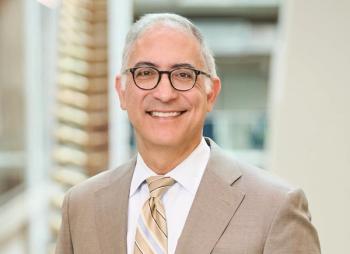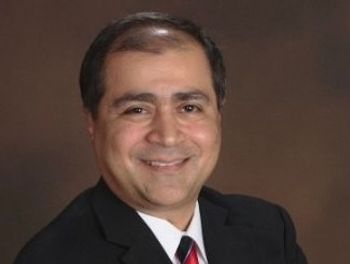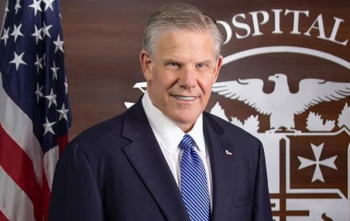
Improving mental health of clinicians: Change the questions, focus on people
More healthcare workers are battling burnout and depression. Stefanie Simmons, chief medical officer of the Dr. Lorna Breen Heroes Foundation, talks about credential reform and how hospitals can help the workforce.
Doctors know the questions are coming.
At some point, many doctors are going to be asked about their mental health, and whether they’ve had a diagnosis or treatment for depression or some other condition, says Stefanie Simmons. The questions could come with an application for a state medical license or for a job with a hospital.
“I know, from the time I started medical school, I'm going to have to answer those questions,” Simmons says. “And it has a huge chilling effect on a clinician's willingness to seek care when they need it.”
Simmons is chief medical officer of the
The foundation is named in memory of Lorna Breen, a physician who died by suicide almost three years ago amidst the stress of the early days of the COVID-19 pandemic. Breen was hospitalized for her mental health, and she thought she’d never be allowed to practice medicine again, Simmons says.
Today, the foundation is working to make changes in federal and state laws, and in the healthcare industry, to bring about structural and cultural changes that will enable more people to get assistance. Last year,
In an interview with Chief Healthcare Executive®, Simmons discusses what hospitals should be doing to change the culture around mental health, and some of the legislative changes that are necessary. Simmons says 29 states - and many hospitals - aren’t complying with best practices on credentialing questions regarding mental health.
More than half of the nation’s physicians (63%) experienced burnout in 2021, according to a
At some point, the source of the wound has to be addressed.
“If we don't address the systems and the operational issues that are at the root of the problem, the patient’s going to die,” Simmons says. “And the patient is the healthcare system that we all rely on.”
(See part of our conversation with Stefanie Simmons. The story continues below.)
Change the questions
In early 2020, Simmons, the vice president of physician and clinical engagement at Envision Physician Services, was in the midst of launching a program aimed at improving physician well-being. The program involved training clinicians on peer support and surfacing administrative issues that were hurting the well-being of clinicians. Envision launched the program just before the COVID-19 pandemic began.
When Lorna Breen’s family launched the foundation in 2020, Simmons reached out to Corey Feist, a co-founder of the organization and Breen’s brother-in-law. She began working with the foundation and eventually joined the board of directors. In January 2023, Simmons became the foundation’s chief medical officer.
The foundation is aiming to change the culture in medicine to ensure healthcare organizations are encouraging clinicians to get help.
“You can build individual resources,” Simmons says. “But if you're not also building a culture where using those resources is not only OK, but encouraged, then they're going to lie fallow. The resources aren't going to get used.”
A key change comes in changing questions on applications for state medical licenses, as well as for positions in hospitals. It’s time to end the practice of asking applicants if they’ve been diagnosed or treated for mental health conditions, Simmons says.
Instead, hospitals and state licensure questions should simply ask applicants if they are impaired in practicing medicine for any reason of physical health, mental health or substance abuse, Simmons says.
“The impairment may be different depending on what you're doing and what you're credentialed to do,” Simmons says. “If I'm doing microsurgery, and I'm on medication that gives me a tremor, that may be an impairment. If I'm a psychologist or a psychiatrist, and I have a tremor, it's not going to impact my ability to give care, right? So impairment means different things depending on what you're doing.”
The foundation has focused on changing those credentialing questions because physicians often avoid getting help because they fear the professional ramifications.
“I can tell you that from personal experience, I can tell you that from the literal hundreds of stories that I have heard from clinicians who have not gotten the care they needed when they've needed it,” Simmons says.
“And I can tell you that it was Lorna, her biggest concern after her mental health hospitalization, that she was not going to be able to practice medicine again because she had received mental health care one time in her life,” she adds. “So that's one of the reasons that is such a big push for us … her family feels that it was one of the largest contributors to her death.”
Simmons says that if she were a patient, she wouldn’t be deterred from seeking care from a clinician who was seeking treatment for a mental health issue.
“If my doctor were receiving treatment for depression, not only would I not care, in terms of them being my doctor, I would feel more comfortable sharing my own struggles with that person,” she says. “I would feel like they maybe had some insight into what it was like to be a patient and to need care. And I would love to have that person as my clinician.”
It’s time to remove questions that deter people from having to disclose they needed help.
“Asking questions about diagnosis and treatment doesn't reduce the burden of mental health problems in healthcare workers,” Simmons says. “It only reduces the number of people who are getting treated and puts the clinicians at risk and ultimately puts patients at risk as well.”
Four key steps
Healthcare leaders that want to create a culture where people get help, and last longer in their jobs, can take four key steps, Simmons says.
1. Change credentialing questions
Replace questions about past treatment for mental health and focus on any current impairments. This removes barriers to getting help, she says. It’s also vital to tell staff about those changes. “If a hospital changes its credentialing questions, and they don't tell any of the clinicians, did the change really make a difference? Not as much as it could have,” Simmons says.
2. Increase options for care
“We know that we have lost physicians to suicide because their only option for mental health care was to receive care at their own hospital from their own colleagues,” Simmons says. “So make sure that your clinicians have options for care outside of their personal colleagues group.”
3. Improve the workplace
Decrease administrative burdens, and let clinicians have a voice in optimizing the workforce, with key performance indicators. “Keep clinicians at the center of all quality initiatives,” she says.
4. Keep people at the center of leadership
Leaders must go back to the basics. Managers must have “relationships with the people you're managing, that you know what's happening with them,” she says. She also says leaders should “vulnerably and appropriately share what's happening with you to destigmatize sharing those stories and those struggles.” Leaders must invest in leadership training that centers emotional intelligence.
Some steps don’t require big expenses, she notes.
“Credentialing reform is free,” Simmons says. “And we've had hospitals change their questions in under 48 hours. It's fast, it's free, and it has a huge impact and sends a huge message.”
Hospitals also need to have someone leading the work on improving the well-being of the workforce. She says it can be a dedicated champion, such as a chief wellness officer, or a wellness committee.
“If a hospital or health center does not already have a committee structure that includes frontline workers, executives, executive champions ,representation from across the workforce, that's a place to start,” Simmons says.
Some healthcare leaders are
Health systems need to see that the resilience of their workers isn’t the problem, especially if they’ve made it through three years of the pandemic, she says.
“You can't say that people aren't resilient enough when they're just being asked to carry more and more and more, because even a granite column will crumble if enough weight is put on top of it,” Simmons says. “And so the key is really to say, well, ‘How can we shore up the structure around you to support you?’”
“Hospitals and health centers are getting the message loud and clear that pizza parties and ‘hero’ T-shirts are not hacking it,” she adds. “It's always nice to feel appreciated. But it's a lot nicer to be appreciated in a way that substantially changes your experience at work. And that's what people are asking for and demanding.”
The








































